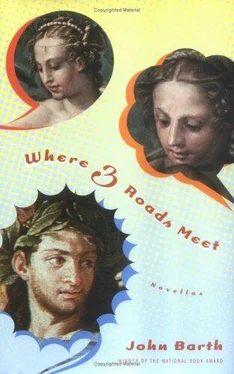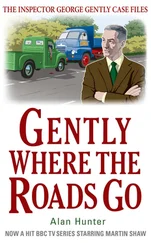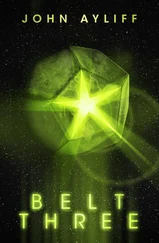John Barth
Where Three Roads Meet
If and when he ever gets his narrative shit together, Will Chase might tell the Story of the Three Freds more or less like this — freely changing names, roles, settings, and any other elements large or small as his by-then-more-seasoned muse sees fit, neither to protect the innocent nor to shield the blamable, but simply to make the tale more tellworthy:
Mid-spring mid-morning in mid-twentieth-century USA — in the mid-Atlantic-coast state of Maryland, to be exact, and even in mid-sentence, as our then young and recently interrupted narrator made to resume his anecdote-in-progress by saying to his apartment-mates, "As I was saying, guys" — their telephone rang again.
"Your turn," his friend Al said to their friend Winnie: a standing joke between that latter pair (although both were in fact seated, on their hand-me-down couch in their gradstudent apartment in the university's high-rise Briarwood Residences, just off campus), inasmuch as in those days before phone-answering machines, Winnie, Al's girlfriend, took all their calls, for reasons presently to be explained, and thus had taken the previously interruptive one (wrong number) a few minutes before. With a roll of her eyes she reached again for the phone — one of those black rotary-dial jobs, standard issue back then — on the hand-me-down end table next to which she customarily sat, when reading or chatting, for just that purpose.
"Hello?"
"If this were a story and you were its narrator," Alfred Baumann advised Wilfred Chase while Winifred Stark attended the caller, "you could stop the action right here and get some capital-E Exposition done: like who the Three Freds are and what they're doing here; what the capital-C Conflict is; what's At Stake for whichever of us is the Protagonist, and why Win takes all our calls in Briarwood Three-oh-four…"
Roger wilco, old buddy, as even callow nonveterans like themselves sometimes said in those postwar days: military radio-communications lingo for Got your message and will comply. Post — World War Two is the when of this story, although the nation's brief peaceful respite after V-J Day 1945 would end in 1950 with North Korea's invasion of South and the American-run UN "police action" to contain that invasion. Excuse Narrator if you knew all that, Reader: It matters because this story's where is the campus environs of a major university — a campus swarming, as were all such in the USA back then, with veterans of that previous war, their educations subsidized by the GI Bill of Rights. At all-male institutions such as this was in those days, the undergraduate student body was thus divided into somewhat older, more life-experienced, and now draft-exempt World War Two vets, many of them married, and younger, greener, soon-to-be-draft-vulnerable hands like the then Will Chase and his only slightly older best friend and mentor, Al Baumann.
Greener, yes, in that neither Al nor Will had shared their war-veteran classmates' transformative experience of military service, not to mention actual combat. But green comes in shades, and in every other respect Al was so much the savvier that as of this telling Narrator still shakes his head at that pair's friendship, wondering what on earth Al B. found interesting in Will C.; what he got from a connection so clearly beneficial to his protégé. Born and raised in one of the city's most desirable neighborhoods as the only child of well-to-do parents, his dad a professor of oncology at the university's medical school, Alfred Baumann had been educated K–12 (as they say nowadays but did not then) at private day schools whose graduates routinely matriculated in the Ivy League. At puberty he discovered in himself a passion for the arts and for academic scholarship; decided by his junior prep-school year that he'd be a poet, a professor of literature or maybe of art history, and on the side a jazz pianist, although he knew his way around classical guitar and string bass as well. Enrolled in the comparably prestigious but decidedly less classy VVLU instead of Harvard/ Yale/Princeton, because it offered an experimental program wherein selected students could on their adviser's recommendation become virtual Ph.D. candidates early in their undergraduate careers, commence supervised original research in their chosen disciplines, and complete their doctorates as early as five years after matriculation. Al was, moreover, no stranger to the capitals of Europe and elsewhere, the Baumanns having often vacationed abroad before and after the war as well as having gone with Doctor Dad to oncological conferences in sundry foreign venues — whence their son had acquired what to friend Will, at least, was an enviable familiarity with places and languages, wines and cuisines, and the ways of the world, including self-confidence with the opposite sex: a sophistication the more impressive because worn lightly, even self-deprecatingly.
"Trivia," Al liked to say about such casually imparted but attentively received life lessons as that slope-shouldered red-wine bottles contain Burgundies and round-shouldered ones Bordeaux, the former to be enjoyed promptly and the latter "laid down" some years to mature; that both kinds need to "breathe" awhile after opening before being drunk (except for Châteauneuf-du-Pape); that provolone has four syllables, not three; that making circles with one's thumbs and forefingers is a handy reminder that one's bread plate on a restaurant table is the one at one's left hand (small "b") and one's drinking glass the one at one's right (small "d"): "It's what's here, here, and here that matters," indicating in turn his or Will's (or Winnie's) head, heart, and crotch. But from whom if not gentle (slope-shouldered, indeed Chianti-bottle-shaped) Al Baumann did Will learn how to tie a full-Windsor necktie knot, navigate the city's bus and trolley lines, successfully hail a cruising taxicab and compute the driver's tip, play sambas and rhumbas and kazatskies and frailichs as the occasion warranted in addition to their new jazz trio's usual repertory? Not to mention what one learned from him in the classroom, as one's junior instructor in Literature & Philosophy I & II, about Homer and Virgil (and Sappho and Petronius and Catullus), Plato and Aristotle (and the Gnostics and the Kabbalists), Dante and Chaucer and Boccaccio (and Scheherazade and Somadeva, Poggio and Aretino and Rabelais), and other classics on (and off) one's freshman/sophomore syllabus, up to and including James Joyce's Ulysses (and Finnegans Wake) …
"And trivia, class, as you may have heard, comes from Latin trivium: literally, a place where three roads intersect — as in Sophocles? — but by extension any public square where people swap idle gossip." The Trivium was also (he went on) the medieval division of the seven liberal arts into Grammar, Logic, and Rhetoric — not to be confused with Cambridge University's tripos, which was a different story altogether: "Okay?"
If you say so, Teach. And so indeed Al said, back then back there, in class and out — all which curricular and extracurricular input Will Chase eagerly "downloaded," as one might put it three decades later, his own background having been a different story indeed from Alfred Baumann's: Depression-era child of minimally schooled though by no means unintelligent small-town storekeepers in the state's least affluent county; graduate of a wartime local public school system so strapped for funds and faculty that its eleventh grade was perforce one's senior year, whence nearly none of the seventeen-year-old diplomates "went off" to college — especially if they'd been lucky enough to escape military service and thus unlucky enough to have no GI Bill to subsidize a higher education that, as a group, they weren't competitive for admission to anyhow. A few of the girls managed nursing school, secretarial school, or the nearby teachers college; most became store clerks, telephone operators, beauticians, or/and young housewives and mothers. Most of the boys found jobs in local offices and retail stores or became tradesmen, farmers, or crab-and-oyster watermen like their dads before them. A few enlisted in the peacetime military. And a handful shrug-shoulderedly took the application exam one spring afternoon for "senatorial" scholarships (whereof every Annapolis legislator was allotted a few to award and then to renew or redistribute annually) to various colleges and universities in the Old Line State. Having so done, the applicants proceeded to their summer employment fully expecting that at season's end it would become their real employment: their life's work.
Читать дальше












